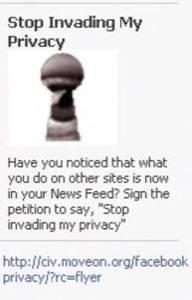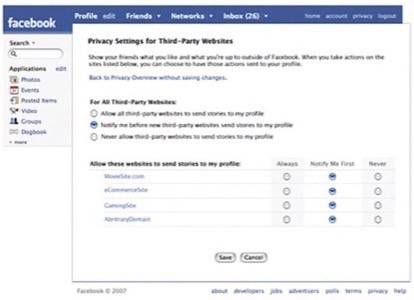Political action and consumer advocacy organization MoveOn this week launched a public campaign against Facebook’s new Project Beacon advertising system (our coverage). MoveOn characterizes the ad system as “a huge invasion of privacy” and has launched a petition to get Facebook to make the system completely opt-in (rather than opt-out as it is currently). MoveOn even blames Facebook for ruining Christmas, including in a press release sent out to the media today quotes from users like this one: “I saw my gf [girlfriend] bought an item I had been saying I wanted…so now part of my Christmas gift has been ruined. Facebook is ruining Christmas!” – Matthew from New York

According to MoveOn’s Civic Communications Director Adam Green, “Facebook users across the nation are outraged that the books, movies, and gifts they buy privately on other sites are being displayed publicly without permission–and it’s time for Facebook to reverse this massive privacy breach.” (CNET) There are a few problems with that statement, though.
First, MoveOn may be overstating the level of outrage among Facebook users. In the past, when Facebook has done something that users don’t like (i.e., create the news feed, open up to non-college users, etc.), many groups have been created almost overnight to protest the issue. Those groups have grown virally, quickly and often top hundreds of thousands of users in a matter of days. Just recently, hundreds of groups popped up around Facebook to protest the mandatory use of the word “is” in status updates — one group had over 160,000 users. I could not find any group, barring MoveOn’s own, protesting Beacon (or SocialAds) with over 100.
MoveOn’s group, which launched Tuesday, has just over 8,000 members at press time. That’s not phenomenal growth, especially considering the amount of press it has had in publications like the LA Times, New York Times, and Wall Street Journal. Adam Green guaranteed me that the group was growing quickly and would “soon be in the tens of thousands” — to be fair, it has grown by about 2,000 users in the past 7 hours, and it seems likely that it will top 10,000 soon. (Green would not share with me the number of people who had signed their petition. Update: Green sent me a follow on email to tell me that the petition numbers are approximately in line with the Facebook group, though he does not have the exact figure at this time.)
But if something as benign as a constrictive verb in status updates can inspire hundreds of protest groups — some with over 100,000 users — but something like this can only get the support of a few thousands people, even this early on, it makes you wonder whether Facebook users are really all that bothered by Project Beacon.

The other thing wrong with Green’s statement to CNET, is that Facebook’s Beacon ads aren’t displayed publicly (unless you count your network of friends and their computer screens as the public), nor are they displayed without permission. Anyone who has run into Beacon ads in the wild knows that Facebook asks before publishing information to your news feed (see image above). Further, you can opt-out for good from having retailers send information to Facebook. MoveOn argues that the opt-out tools aren’t good enough, and this is where they finally make some very good points.
Beacon Needs A Blanket Opt-Out Feature
The most glaring omission from the opt-out feature is that you can’t opt-out from the entire program. You have to do it on a site-by-site basis, and are only given the opportunity AFTER you’ve visited that site and it has collected data from you. When TechCrunch first broke the Beacon story, they included a screenshot (below) showing that users could opt-out from the program entirely by checking a single radio button. However, when Beacon went live, that feature was conspicuously missing.
What happened to the blanket opt-out feature? Image from TechCrunch.

While I’m not convinced that the program necessarily needs to be opt-in, Facebook certainly needs to provide a blanket opt-out option. Forcing users to continuously update their privacy settings every time they come in contact with a new Beacon partner is obnoxious and a good way to turn users against the system.
One thing that MoveOn fails to address, and which may be a more serious potential privacy violation, is that even after opting out of the program, there is nothing to guarantee that Facebook isn’t still collecting data on where you shop and what you buy, and using it to deliver ads on the site. I’m not a legal expert by any stretch of the imagination, but I could find nothing in the Facebook privacy policy that guaranteed that opting out of Beacon meant that Facebook would no longer receive data from those partners. In cases like this, whose privacy policy supercedes the other, Facebook’s or the third-party web site’s?
Anyone who want to completely opt-out of Beacon now, can follow these instructions for how to block the ads in Firefox.
A Separate Privacy Issue At Facebook
So while MoveOn may be overstating the level of user anger over Beacon, their campaign makes at least one good point: Facebook needs to provide better opt-out tools and do a better job of publicizing privacy options to users. That said, there is, in my opinion, a more pressing privacy violation occurring on Facebook right now. Yesterday, VentureBeat reported that Facebook applications now have access to user email. This, like everything else on Facebook, is opt-out, but unfortunately, for any application you’ve already installed you’re opted in by default. Sorry, makers of Scrabulous and Bloggific, I like your applications, but I don’t want you bothering me via email.

It’s bothersome that Facebook automatically gave third-party application developers (you know, the ones who made the apps that they expressly warn you were not developed by Facebook) access to my email without my permission — and without notifying me of the change. Worse, when installing new applications, the “Allow this application to…” settings, do not include the email option. Which means that after installation, you have to take an extra step to disable the ability for that app’s developers to send you email. Thanks for making me jump through hoops to keep my privacy, Facebook.
Conclusion
So is Beacon evil? I don’t think so. Is it ruining Facebook? Not yet, at least, not for me. I haven’t seen a ton of Beacon ads appear on my news feed, and Facebook in the past day or two introduced “thumbs up” and “X” icons next to items on the news feed that train it to give you more of what you like. I haven’t seen a Beacon ad in a couple of days, but I do see the voting options next to “Name is a fan of company” items (which I believe are part of SocialAds), so I would imagine they are on Beacon feed posts as well. If that’s the case, you should theoretically be able to train your feed not to show you as much Beacon material — or, one can hope that’s the case.
But are there legitimate privacy concerns with Beacon? That seems likely. Hopefully Zuckerberg and Co. listen to MoveOn, at least insofar as to add a blanket opt-out feature to the system — one which they apparently once planned to include. And even more pressing in my mind, I hope they stop updating my privacy permissions on installed applications without my knowledge (i.e., giving apps developers permission to email me), and rather make changes like that opt-in instead of opt-out.
What do you think about Beacon? Is MoveOn blowing a lot of hot air or has Facebook crossed the line? What about the email options on Facebook applications, are you okay with them or upset? Let us know in the comments below.









